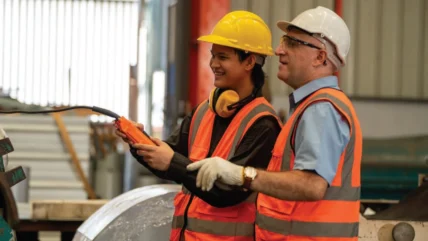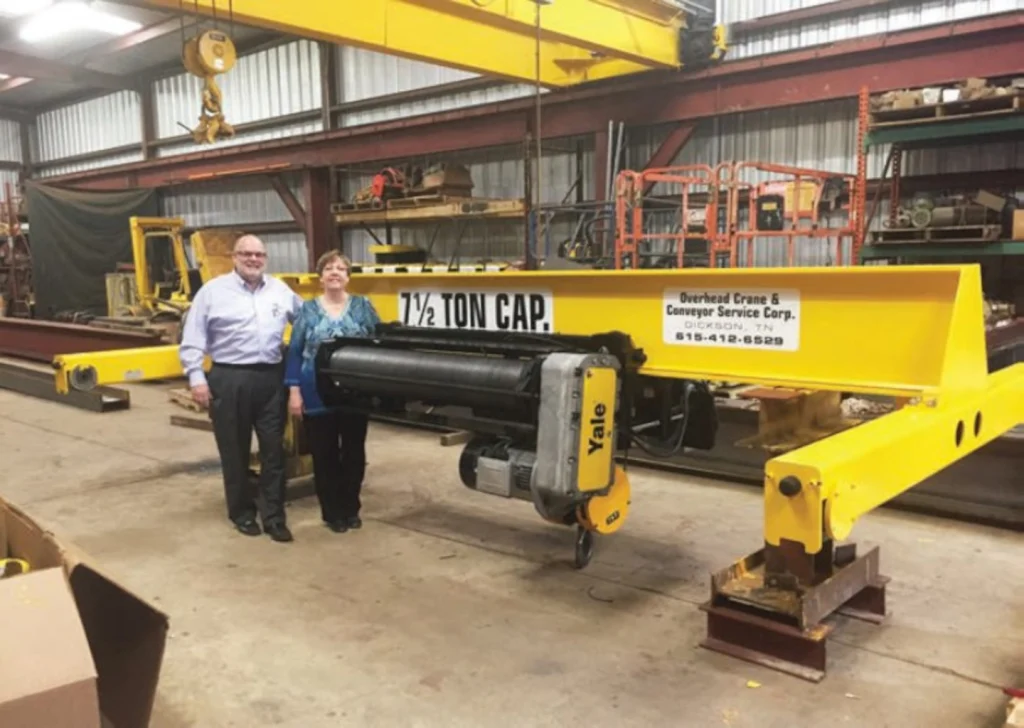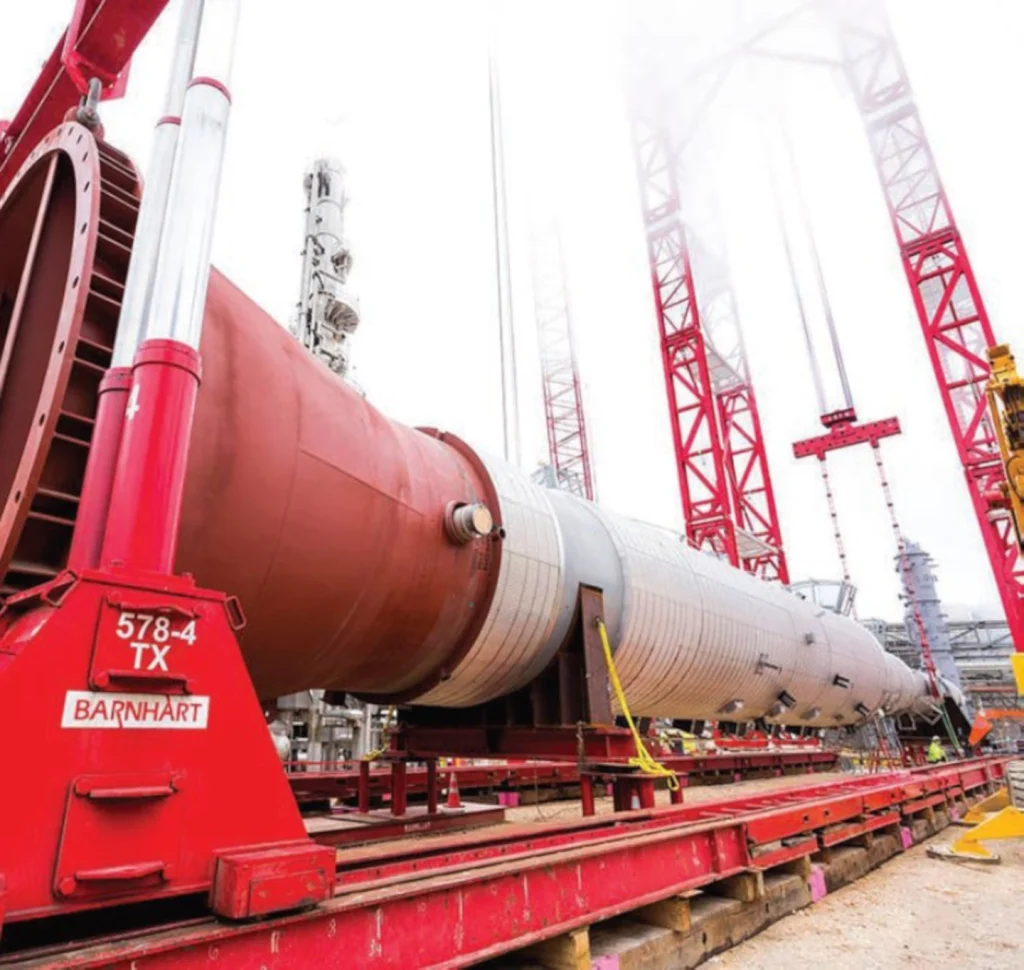
There’s optimism that the next few years in the Tennessee overhead crane and hoist manufacturer, service and distributor sectors will be good ones. For those in the know, this will be driven by a supportive political climate (both at the state level and nationally) as well as so-called positive monetary and business environments. Not forgetting, access to buoyant local industries suitable to offering services within: from manufacturing, to automobiles, to construction. It’s not like ‘commerce’ is part of the state motto for nothing.
Indeed, Tennessee is a state with a strong business focus – from the Blue Ridge mountains in the east to the wide plains and Mississippi in the west, the gross state product was worth $432.3bn – with a growth of 3.2% over the proceeding five years, according to IBISWorld figures.
That’s even though the landlocked southeastern region is more well known for its cultural impact – blues, country and rockabilly music, for starts, as well as being a critical centre to the careers of Elvis Presley, Johnny Cash and Roy Orbison – and tourist attractions. Not least Dollywood, the Civil Rights Museum and the Great Smoky Mountains National Park.
However, business does intersect with, and often precedes, culture and tourism. Notably, incumbent Governor Bill Lee has recently written to the National Football League petitioning that the globally important 2029 Super Bowl be held at the still-under-construction stadium that will be the new home of the football club Tennessee Titans. It’s a huge project: 60,000 seats designed to host major sporting events, and estimated to cost circa $2bn with around half of the spending underwritten by public funds.
For the state’s governor, though, there would surely be local pride in helping to secure such a big-ticket sporting occasion for the state, and it’s hardly the only construction-minded project on his mind. That’s because construction is a big deal in the ‘Volunteer State’. According to The Construction Association statistics, in 2024, construction contributed $23bn (4.3%) to the state’s GDP, with 17,000 construction businesses in existence. It’s enabling a growing employment base – growing by 3% to YDT August 2024.
This growth is no mere accident: such focus on building is backed by the state legislature. Governor Lee’s 2025–2026 financial year foci include $1bn into state infrastructure and $60m into home construction as well as further cash injections into water and nuclear projects. Indeed, an application for $800m of funding to build the country’s first small modular nuclear reactor has been sent off, and there’s bullishness regarding a record-breaking investment into the project.

For crane and hoist operators, it signals a growing sector to supply into backed by government cash. Not least, Barnhart, a Memphis operator on the larger side of construction and heavy component lifting, boasted about their involvement in a bespoke cemetery project in the city that required their 350t hydraulic crane – a real diversity of opportunity.
As Terrence Moore, owner of Overhead Crane & Conveyor Service Corp (OCCS), who works with customers to design and manufacture custom cranes, as well as offering training and maintenance services, says: “We saw many projects funded federally, and it definitely created a growth opportunity for our company.”
But it’s not just construction. Across different industries in the private sector, Barrett Firearms is expanding its headquarters, Amazon has built new warehouses, and Walmart is expanding warehouse square footage, and despite wobbles, Nissan is still a major player in the state. Here, for the many crane and hoist businesses that supply everything from skid systems and conveyors to bridge cranes and monorails, there is a clear customer base with money to spend.
Indeed, the manufacturing sector, a critical client base for crane and hoist suppliers, is hugely important within the state boundaries. By the end of the financial year 2023, it was worth 13.4% of Tennessee’s GDP, with employees taking home $15,000 per annum more than the non-farm average.
Yet, Tennessee business isn’t all on the gargantuan side. In construction, for example, it’s residential too. Nashville is one of the fastest growing residential areas in the country, with Clarksville, Spring Hill and Smyrna rapidly ballooning urbans. Barnhart, for their part, boasts about work in the residential construction business, too.
Indeed, such work is linked to rapidly growing sectors, such as healthcare, drawing people in. Tennessee, for one, cannot be accused of standing still, and crane and hoist firms are getting in on the action in an indispensable supporting role.

Overhead optimism
Indeed, OCCS’ Moore says “there’s a sense of optimism” in the Tennessee crane and hoist industry, not least because of the variety. “We’re really busy,” he adds. “We see really good things in the industry.”
As a family-operated firm, Moore is hardly getting involved in some of the projects that make headlines outside the state – football stadium construction or otherwise. But there’s a wide market for crane and hoist specialists. At the bigger end, HSC Tennessee, part of the broader HSC business, largely supplies and services cranes involved in heavy manufacturing across the southern states as well as internationally.
The firm has worked on projects including Boeing assembly lines for commercial aircraft to supplying Toyota, SpaceX and even projects in Canada and the UK. Elsewhere, Barnhart, known for its work on major projects, has even boasted of working on the Baltimore bridge collapse, well outside the state – proving Tennessee is a good base to proffer services more widely.
Indeed, as HSC see it, sharing their expertise with Manufacturing in Focus, such a breadth of business of opportunity meant the company could expand, initially from conveyors out to cranes as well as continuing to operate in some of the heavier end of the manufacturing sector, such as rail, oil and automobile and military clients.
This is tied to what Tennessee does best, which is, as Governor Lee put it in a recent state address, “adapting”. HSC are tapping into the growth parts of the manufacturing sector in the state. Here, according to National Association of Manufacturers data, there’s an automobile industry (worth $11.6bn in 2023, up $1.1bn YoY) and machinery manufacturing, also growing $600m over the period. For operators, it means being aware of the direction of travel of business in the state.

Small firms still punching
But even down to smaller firms, like Moore’s, there is a breadth of business opportunity. OCCS sees work on federal and municipal projects in steel fabrication (a sector which grew by $500m from 2022 to 2023), and in the automotive industry, too. Indeed, with the state’s budget including massive financing, not least the $100m for water resourcing projects, as well as other upgrades, there is space for crane suppliers to support, thanks to federal funds. “A major portion of our business is wastewater treatment facilities, and federal funds were definitely a help during these times… it definitely created a growth opportunity for our company,” he says.
Indeed, OCCS provide cranes for the water industry, including both waste water and water purification projects for the setting and pulling of pumps for maintenance. But it’s not like state projects end with liquid. OCCS also supply military missions, with the Army, National Guard, Air Force and Nasa, while HSC counts Lockheed as a trusted client. Hardly surprising given that the Office of Local Defense Community Cooperation showed by the end of the 2023 financial year that defence spending in the state sat at $4bn, with 23% of that total spent on equipment and 18% on construction.
And with such growth and spending across several sectors, it’s unsurprising Moore is bullish on the future. “We see good things for the next several years,” he says. Again, he sees this as a result of the diversified opportunity market. While bigger firms may take blue chip clients – Hoist & Crane Service Group work with Compass Group; HSC with an array of internationally-renowned brands from Boeing to Harley Davison – he believes that consolidation and buyouts leave space for a more bespoke or boutique service.
Last year saw Hoist & Crane Service Group buy out Nashville-based Hoist & Crane Company while Memphis-headquartered Barnhart Crane and Rigging Company acquired five other firms, and Clark Crane was bought out by Capital Extension Crane & Lift. “Of course, consolidation within the industry from investment money and mergers has definitely changed the environment,” says Moore. “But we see a niche where we focus on the middle to smaller companies who need comprehensive service and treatment that larger companies can’t or are unwilling to provide.”

Proud of their adaptable heritage of the smaller family-owned firm – in 2018, Moore purchased the now 35-year-old firm, described it as familyoriented – the Dickson supplier might point to the diversity of offerings as being able to adapt to where there is a gap in the market. From maintenance, inspections and in-house training of operators to turnkey solutions to adapting to what customers need. In Tennessee, it seems, there’s room for suppliers of all stripes and sizes.
Bigger political and economic picture
But it’s hardly like the state operates in a vacuum, and Moore believes the country-wide political and financial situation has an impact on crane business within Tennessee. For one, he believes the current administration is less hesitant and is powering forward with supporting business. Here, the Trump government’s plans to double down on AI have already led to directives on energy and infrastructure projects. Follow the logic chain even briefly, and one might connect the dots to the Tennessee governor looking to capitalise by backing nuclear expansion because of AI’s huge power needs. For crane suppliers such as Barnhart who can get involved in bigger construction projects, proverbial lips will be licked.
Elsewhere, Trump’s government looks set to continue the Biden-era focus of onshoring US manufacturing. Prior to Trump, and according to Construction Dive figures, $988bn of manufacturing business was onshored over the past few years – from electric vehicle plants to chip fabrication. Both are industries with a presence in Tennessee. In addition, Trump’s America First plan sets to boost manufacturing through tax breaks and trade tariffs. All positive for those who work with conveyors and monorail suppliers, but this isn’t just one-way traffic.
Though Moore says that lower interest rates are also playing their part in boosting the industry – not least in helping crane and hoist firms understand whether to add more locations, such as HSC recently did in Tennessee or with OSSC operating in the eight states around their headquarters – tariffs can have a blowback impact.
Nissan, which has a big manufacturing base in Smyrna, was struggling before tariffs were rumoured (set to come in 2 April 2025), but there is a belief that they are causing uncertainty. It could mean scaled-back production and job losses. On the flipside, The Latin Times reported that tariffs might actually result in Tennessee winning more of the industry as Mexican production, particularly for Nissan, moved into the state. It’s all rather confusing.
But what is known is that, as of 2022, 6% of all cars made in America were from Tennessee, forming 15% of the state’s total export. With four major assembly plants and automobile operations found in 88 of the 95 counties, it means the general outlook for the sector – now defined by the need to technologically transition, political change and the threat of Chinese competition – has a major impact on both the sector and those supplying it.
Moore admits such proffered rule changes around the sector, but it won’t dampen his overall optimistic outlook: “The automotive industry affects our involvement, and the past seven years has had some effect on business, but in general, all the companies are strong and growing.”
That said, it’s not just the private sector wary of the financial outlook; Moore has noticed some retreat in municipal purse-loosening. For one, Nashville’s spending plans are described by its Mayor Freddie O’Connell as “tightening the belt a little” while Memphis is looking to balance its budget. Even at the state level, the budget is lower than in previous years, despite large-scale spending commitments. It’s being felt by crane and hoist operators, and for Moore, it’s a warning. “It just feels like towns and cities are watching their spending,” says Moore. Perhaps adaptability will be key here again.
Talent and technology
Also seen as important is what the labour market can offer. Talent is critical to being able to step up and deliver what customers want, write HSC in Manufacturing in Focus: whether that’s providing material handling system for Peterbilt Motors, delivering for Lockheed Martin or training client employee bases in operating norms.
In order to keep the business running smoothly, HSC sees training as critical: technical training in mechanical components which can boost custom thanks to quick troubleshooting on products and safety training are seen as key to the business and there’s a sense, at least from smaller to mid suppliers, keeping talent means treating them as family. “A family-oriented environment has helped us keep staff,” says Moore. “But it’s also about listening to employees and giving them decision-making authority, treating them well and offering good conditions.”
This has resulted in, as Moore says, being able to grow the workforce – critical when also servicing not just Tennessee but outside the state, too. But the labour market is tight; unemployment in the state was, at last count, 3.7% according to the Tennessee Department of Labor and Workforce Development in January 2025 – below the US average. Indeed, Barnhart’s CEO Alan Barnhart recently relayed how he believes the labour shortage in skilled trades, such as crane services, might result in companies having to build their own talent bases. “We should just start a school from scratch,” he wrote in KHL.com in 2023.
But there is an opportunity to get the right talent. At HSC, they’ve grown by 10 staff over the year, which they say tracks to their growth projections, expecting to be at $80m revenue in five years’ time with comparable EBITA. Barnhart, meanwhile, has started their own training courses to bring staff into the industry. And when employees get into the industry, it’s about keeping talent up to date. At HSC, at least, this means ensuring that staff are safety checked, including machine guard and welding and cutting safety as well as understanding the latest advancements in electronics and mechanical components.
This is critical, says Moore, to keep up with the “necessary education” on the latest in crane designs. For staff and senior managers, it means being up to date on any changes the industry might throw at them. As Moore describes it, it might mean wrapping one’s head around new crane technology, such as hoists that don’t come with mechanical load brakes or the move towards true vertical lift as standard. “There’s also European designs [entering the market] and having to replace cranes that are 25 years old,” he says. For those who want to stay competitive, intimates Moore, it means being able to communicate effectively. “We have to explain [to customers] between what is on spec and what is coming on the shelf.”
Not least, that’s because of the wide range of services crane operators offer in Tennessee. From training, operating, installation, modification and troubleshooting of everything from gantry cranes to traditional hoists to mezzanine framing and monorails – a hardly surprising offering. There are lots of opportunities in the Volunteer State after all, often backed by the state’s ambitions itself. As Moore says: “We see good things.”






